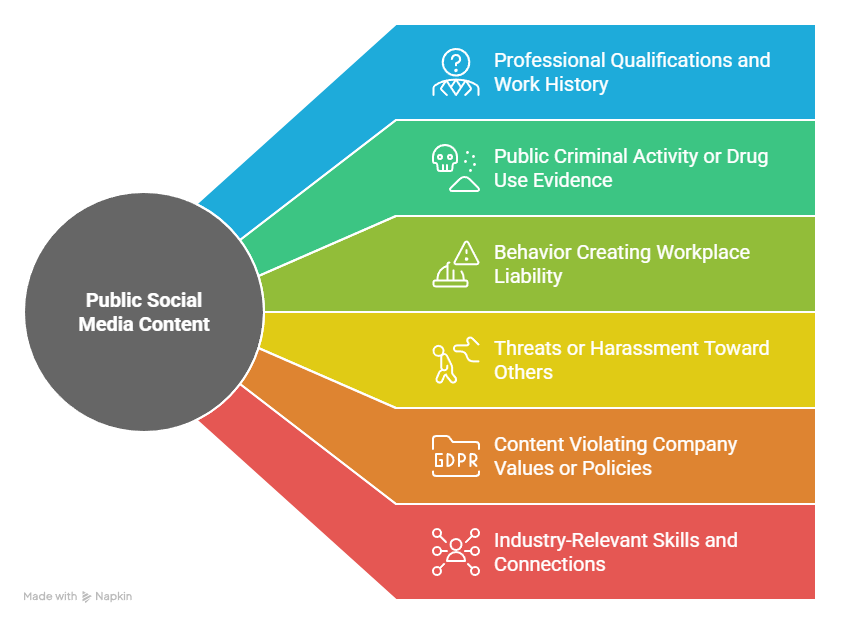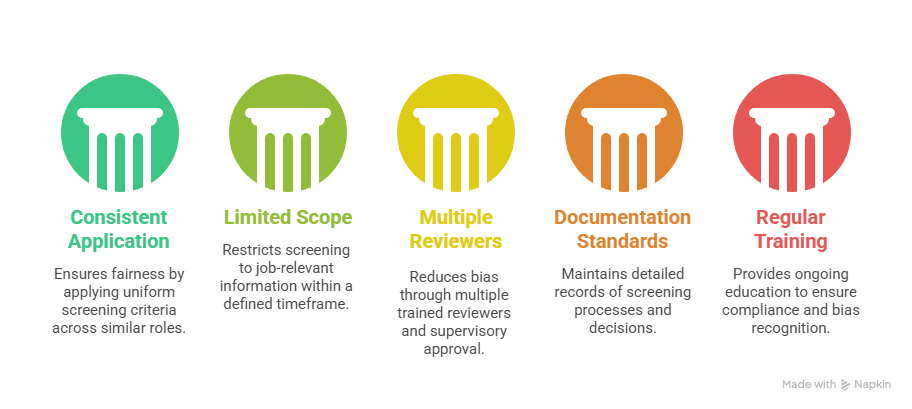Social media background checks have become a standard hiring practice, but employers must navigate complex legal requirements to avoid discrimination claims and privacy violations. Understanding federal and state regulations, implementing compliant screening policies, and following proper procedures are essential for legally conducting employment social media screening.
Key Takeaways
- Social media background checks are legal but heavily regulated - Employers must comply with FCRA requirements, anti-discrimination laws, and state-specific privacy regulations when screening candidates' online presence.
- Third-party screening services require FCRA compliance - Using professional social media screening companies triggers Fair Credit Reporting Act obligations, including candidate consent and adverse action procedures.
- Direct employer screening has fewer legal requirements - When hiring managers review social media directly, FCRA rules don't apply, but discrimination and privacy laws still govern the process.
- State laws create additional restrictions - Several states have enacted specific social media screening laws that limit what employers can request or review during the hiring process.
- Consistent policies prevent discrimination claims - Implementing standardized social media hiring compliance procedures helps ensure equal treatment and reduces legal liability.
- Documentation and training are crucial - Proper record-keeping and staff education on workplace social media policies minimize legal risks and improve hiring outcomes.
Legal Framework for Social Media Background Checks
The legal landscape surrounding social media screening combines federal employment law with emerging state regulations. The Fair Credit Reporting Act (FCRA) governs third-party background checks, while Title VII and state anti-discrimination laws protect candidates from bias. Additionally, the National Labor Relations Act restricts employer access to certain protected activities on social platforms.
Employment social media screening falls into two categories with different legal implications. When employers hire third-party companies to conduct social media background checks, they must follow FCRA procedures including obtaining written consent and providing adverse action notices. Direct employer screening bypasses FCRA requirements but remains subject to discrimination and privacy protections. Current federal legislation doesn't specifically address social media screening, creating a patchwork of state laws and court decisions.
FCRA Compliance Requirements
Third-party social media screening services must follow strict Fair Credit Reporting Act procedures when providing employment reports. Employers using these services become subject to FCRA obligations including pre-screening disclosures, written authorization, and adverse action procedures. The screening company must also maintain reasonable procedures to ensure maximum possible accuracy of reported information.
Key FCRA requirements include providing standalone disclosure documents, obtaining explicit written consent, and following proper adverse action procedures if negative information influences hiring decisions. Employers must also comply with state-specific background check laws that may impose additional waiting periods or disclosure requirements. These federal protections ensure candidates receive proper notice and opportunity to dispute inaccurate information.
Anti-Discrimination Law Applications
Federal anti-discrimination laws apply to social media screening even when information is publicly available. The Equal Employment Opportunity Commission has issued guidance emphasizing that employers cannot use protected class information discovered through social media in hiring decisions. Furthermore, screening practices that disproportionately impact protected groups may violate disparate impact provisions.
Title VII protects against discrimination based on race, color, religion, sex, or national origin discovered through social media posts. The Americans with Disabilities Act restricts use of disability-related information, while the Age Discrimination in Employment Act protects older workers from age-based screening bias. Additionally, the National Labor Relations Act protects employee rights to discuss working conditions online, limiting employer retaliation for protected union activities.
State-Specific Social Media Screening Laws
Twenty-eight states have enacted legislation restricting employer access to personal social media accounts during the hiring process. These social media screening laws typically prohibit requesting passwords, requiring account access, or demanding friend requests from job candidates. However, most states allow employers to view publicly available information and maintain workplace social media policies.
| State Category | Key Restrictions |
| Password Protection Laws | Cannot request login credentials or passwords |
| Account Access Restrictions | Cannot require friending or account additions |
| Public Information Access | May view publicly available posts and profiles |
| Employee Protection Laws | Cover both applicants and current employees |
States with comprehensive social media privacy laws include California, Illinois, Michigan, and New York. These jurisdictions often include additional protections for current employees and may require specific notice procedures. Employers operating in multiple states must comply with the most restrictive applicable laws to ensure comprehensive compliance.
California Employment Social Media Regulations
California Labor Code Section 980 prohibits employers from requiring or requesting access to personal social media accounts. The law covers both job applicants and current employees, with specific protections for password sharing and friending requirements.
California's law includes exceptions for workplace investigations and regulatory compliance requirements. Employers can also maintain policies regarding professional social media use and company-related communications. However, they cannot retaliate against employees who refuse to provide personal account access or participate in social media friending requests.
What Employers Can and Cannot Screen
Public social media content generally remains accessible for employer review, including posts, photos, and professional profiles on platforms like LinkedIn, Twitter, and Facebook. Employers may evaluate information relevant to job performance, such as professional qualifications, public behavior, and content that could impact workplace safety. However, they cannot use protected class information or private communications in hiring decisions. The distinction between public and private content determines screening boundaries, with privacy settings indicating user expectations.

- Professional qualifications and work history
- Public criminal activity or drug use evidence
- Behavior that could create workplace liability
- Threats or harassment toward others
- Content violating company values or policies
- Industry-relevant skills and connections
Courts have generally supported employer access to truly public information while protecting privacy-controlled content. Employers should establish clear guidelines about acceptable screening methods and prohibited investigative techniques to ensure legal compliance.
Platform-Specific Considerations
Different social media platforms present unique screening considerations and privacy implications. LinkedIn profiles are designed for professional networking and generally appropriate for employer review. Facebook's privacy controls create varying levels of content accessibility, while Instagram and Twitter may contain more personal information requiring careful evaluation.
Professional platforms like LinkedIn typically provide job-relevant information including work history, recommendations, and industry connections. Personal platforms require more careful screening to avoid protected class information while identifying legitimate workplace concerns. Employers should establish platform-specific guidelines and train reviewers on appropriate evaluation techniques for each social media environment.
Prohibited Screening Activities
Employment social media screening laws specifically prohibit certain employer actions during the hiring process. These restrictions protect candidate privacy while allowing legitimate business screening needs. Understanding these boundaries helps employers avoid legal violations and potential lawsuits.
Prohibited activities include requesting social media passwords, requiring candidates to add company representatives as friends, and accessing private content through deceptive means. Additionally, employers cannot use social media information to discriminate based on protected characteristics or retaliate against protected activities. These restrictions apply to both direct employer screening and third-party screening services used by companies.
Implementing Compliant Social Media Screening Policies
Effective workplace social media policies establish clear guidelines for both screening procedures and employee social media use. These policies should define what information reviewers may consider, establish consistent evaluation criteria, and document decision-making processes. Training programs ensure hiring staff understand legal boundaries and company expectations. Best practices for social media hiring compliance include limiting screening to job-relevant information, using multiple reviewers to reduce bias, and maintaining detailed documentation of screening decisions.

- Consistent Application: Apply screening equally across similar positions to avoid disparate treatment claims.
- Limited Scope: Restrict screening to job-relevant information and establish clear time limits for content consideration, typically focusing on recent activity within 12-24 months.
- Multiple Reviewers: Use trained reviewers to reduce individual bias and improve decision-making accuracy. Require supervisory approval for adverse decisions based on social media findings.
- Documentation Standards: Maintain detailed records of screening procedures, findings, and decision rationales while avoiding protected class references. Document training completion and policy acknowledgments from all screening personnel.
- Regular Training: Provide ongoing education for hiring staff on legal requirements, company policies, and bias recognition to ensure compliant screening practices. Update training materials as laws evolve and new platforms emerge.
Companies should also establish incident response procedures for problematic social media discoveries and create escalation paths for legal consultation. Regular policy audits help identify compliance gaps and update procedures based on legal developments.
Creating Standardized Review Procedures
Standardized social media background check procedures ensure consistent application across all candidates and positions. These procedures should specify which platforms to review, time limits for content consideration, and criteria for evaluating information relevance.
Documentation templates help maintain detailed records while protecting against discrimination claims. Reviewers should use standardized forms to record findings, note decision rationales, and flag any concerns requiring legal review. These templates also ensure consistent information collection and reduce the risk of bias in screening decisions.
Training Requirements for Screening Personnel
Comprehensive training programs ensure hiring staff understand social media screening boundaries and legal requirements. Training should cover federal and state laws, company policies, bias recognition, and documentation procedures. Regular refresher sessions help maintain compliance as laws evolve and new staff join hiring teams.
Training modules should include practical exercises using sample social media profiles to test reviewer judgment. Staff must learn to distinguish between job-relevant information and protected class data that cannot influence hiring decisions. Documentation of training completion protects companies against claims of inadequate preparation or discriminatory practices.
Risk Management and Best Practices
Effective risk management combines legal compliance with practical hiring improvements through social media screening. Companies should conduct regular legal reviews of screening policies, provide ongoing staff training, and maintain detailed documentation of procedures. Insurance considerations may include employment practices liability coverage for social media-related discrimination claims. Risk mitigation strategies focus on consistency, documentation, and legal compliance across all hiring activities.
| Risk Area | Mitigation Strategy | Implementation Timeline |
| Discrimination Claims | Standardized procedures and training | 30-60 days initial setup |
| Privacy Violations | Platform-specific guidelines | Ongoing policy updates |
| FCRA Non-Compliance | Third-party vendor management | Immediate for new vendors |
Companies should also establish incident response procedures for problematic social media discoveries and create escalation paths for legal consultation. Regular policy audits help identify compliance gaps and update procedures based on legal developments. Working with employment attorneys familiar with social media screening laws provides additional protection against emerging legal risks and ensures policies remain current with evolving regulations.
Future Trends and Emerging Issues
Social media background check practices continue evolving with new technologies and changing legal landscapes. Artificial intelligence screening tools raise questions about algorithmic bias and fair hiring practices. State legislators are considering expanded privacy protections, while federal agencies examine discrimination risks in automated screening systems. Emerging trends include increased use of AI-powered screening tools, expanded state privacy legislation, and growing employee expectations for social media privacy.
Companies should monitor legal developments in key jurisdictions and consider how evolving social media platforms affect screening procedures. Generational differences in social media use may require adjusted screening approaches, while remote work trends increase reliance on digital background information. Staying current with industry best practices and legal requirements ensures continued compliance and effective hiring outcomes as the social media landscape continues to change.
Conclusion
Social media background checks offer valuable hiring insights when conducted within proper legal boundaries. Employers must balance screening benefits with compliance obligations under federal and state laws. Implementing comprehensive policies, training programs, and documentation procedures helps companies realize screening advantages while minimizing legal risks. Regular policy reviews and legal consultation ensure continued compliance as regulations and social media platforms evolve.
Frequently Asked Questions
Are social media background checks legal for employers?
Yes, social media background checks are legal when conducted in compliance with federal and state laws. Employers can review publicly available social media content but cannot request passwords, require account access, or use protected class information in hiring decisions. Third-party screening services trigger additional FCRA compliance requirements.
What social media information can employers legally consider?
Employers may consider publicly available information relevant to job performance, including professional qualifications, public behavior, and content affecting workplace safety. They cannot use information about protected characteristics like religion, race, or political beliefs in hiring decisions, even if publicly posted.
Do employers need candidate consent for social media screening?
Consent requirements depend on screening methods. Direct employer review of public social media content typically doesn't require specific consent, though disclosure may be advisable. Third-party social media background check services require written FCRA consent and disclosure procedures.
Which states have social media screening laws?
Twenty-eight states have enacted laws restricting employer access to personal social media accounts. These laws typically prohibit requesting passwords or requiring account access while allowing review of public content. States with comprehensive protections include California, Illinois, Michigan, and New York.
How should employers document social media screening decisions?
Documentation should focus on job-relevant findings and decision rationales while avoiding protected class references. Companies should maintain records of screening procedures, reviewer training, and consistent policy application. Detailed documentation protects against discrimination claims and demonstrates compliance efforts.
Can employers screen current employees' social media accounts?
Employer rights to screen current employee social media depend on state laws and employment agreements. Many state social media privacy laws protect current employees from password requests and account access demands. Employers may still review public content relevant to workplace conduct or policy violations.
Additional Resources
- EEOC Guidelines on Social Media and Employment Discrimination
https://www.eeoc.gov/newsroom/eeoc-issues-updated-guidance-social-media-and-employment-discrimination - State Social Media Privacy Laws Summary
https://www.ncsl.org/technology-and-communication/state-laws-prohibiting-access-to-social-media-usernames-and-passwords - FCRA Compliance Guide for Employers
https://www.ftc.gov/business-guidance/resources/using-consumer-reports-what-employers-need-know - SHRM Social Media and Employment Law Resources
https://www.shrm.org/topics-tools/legal/employment-law/social-media-employment-law - National Labor Relations Board Social Media Guidelines
https://www.nlrb.gov/about-nlrb/rights-we-protect/your-rights/employer-union-rights-and-obligations - Privacy Rights Clearinghouse Employment Background Checks
https://privacyrights.org/consumer-guides/employment-background-checks
Still have questions?
Get in touch with our team today for a personalized demo and discover how our tailored volume pricing and packages can drive results for your business!
How useful was this page?*
Note: your comments are anonymous. We use them to improve the website. Do not include any personal details.
Visit our FCRA Compliance Tool or leave a message here if you need a response.
From the blog Explore the GCheck Content Hub

Background Screening for Remote Employees: A 2026 Operational Guide
27 Jan, 2026 • 16 min read
What Drugs Does a 10 Panel Test Detect? 2026 Guide for Workplace Screening
27 Jan, 2026 • 21 min read
Level 1 vs Level 2 Background Checks: A Strategic Framework for 2026 Hiring Decisions
27 Jan, 2026 • 19 min readThe information provided in this article is for general informational and educational purposes only and should not be construed as legal advice or a substitute for consultation with qualified legal counsel. While we strive to ensure accuracy, employment screening laws and regulations—including but not limited to the Fair Credit Reporting Act (FCRA), Equal Employment Opportunity Commission (EEOC) guidelines, state and local ban-the-box laws, industry-specific requirements, and other applicable federal, state, and local statutes—are subject to frequent changes, varying interpretations, and jurisdiction-specific applications that may affect their implementation in your organization. Employers and screening decision-makers are solely responsible for ensuring their background check policies, procedures, and practices comply with all applicable laws and regulations relevant to their specific industry, location, and circumstances. We strongly recommend consulting with qualified employment law attorneys and compliance professionals before making hiring, tenant screening, or other decisions based on background check information.

